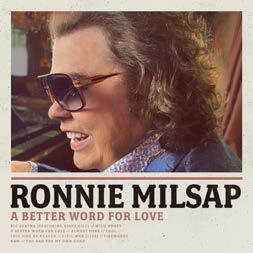
10 minute read
REVIEWS New music from Ronnie Milsap, Alan
A Better Word for Love
Black River Entertainment
RONNIE MILSAP

The timeless talent of Ronnie Milsap is in excellent form on this long-anticipated new release — A Better Word for Love. His piano-driven take on country music has led to a long and successful career, many awards, and a place in the Country Music Hall of Fame. The wide range and effortless power of his voice combined with his passionate and sincere interpretations, allow him to cover a wide range of styles and emotions — while making every song his own. Produced by longtime co-conspirator Rob Galbreath, the album is a wonderful overview of an artist who still has the goods in every way and has a lot to say.
The album opens with “Big Bertha,” a hilarious blues-meets-country duet with the inimitable Vince Gill. The tune was written by Carl Perkins, and the sparks fly right off the bat. Jerry Kimbrough and Larry Franklin trade hot licks on guitar and fiddle, while Larry Paxton on bass and Lonnie Wilson on drums lay down a smokin’ groove. “Wild Honey” features John Willis on electric guitar and Paul Franklin on steel with a soaring, enthusiastic vocal by Milsap.
The title track, a ballad written by Local 257 members Al Anderson and Gary Nicholson, is a timeless ode to true love that goes straight to the heart, and is beyond any time or genre. “Almost Mine” immediately takes you back to a 1960s honky tonk with Catherine Marx’s ringing piano intro, and the call and response between her and Milsap, surrounded by a large ensemble of Nashville’s finest players and singers, is heartbreakingly gorgeous.
Thomas Cain’s “Fool” has a sparse but lush R&B vibe, with Steve Holland’s spare drumming and Drew Lambert’s bass laying a solid foundation for Milsap’s pleading vocal and Marx’s understated keyboard work. “This Side of Heaven” is a power ballad featuring Brent Mason on gut string fills, while Milsap and longtime collaborator Bruce Dees add chanting, hypnotic background vocals that stay with you long after the song is over. “Civil War” is a live cut from 1993, and well worth the wait. You can hear Milsap’s powerful voice bouncing off the walls of the venue – in a good way — and the band, including Jamie Brantley’s soaring electric guitar, sounds fantastic. “Fireworks” is a powerhouse track featuring triple electric guitars by Steve Gibson, James Mitchell and Brantley, with punchy synth by Shane Keister, and a smoking rhythm section of Michael Rhodes and Lonnie Wilson.
The album closes with “Too Bad for My Own Good,” a tale of love gone out of control. Milsap’s liquid vocal bends effortlessly over a nostalgic '80s funky groove, tasty guitar licks by Chris Leuzinger and a great saxophone solo by Sam Levine.
It is great to hear an artist like Ronnie Milsap, whose string of hits goes back to the early ‘70s, creating music that is just a vital as his biggest hits, revisiting his roots, and breaking new ground as well. — Roy Montana
DAVE JACQUES
What Was I Thinking? Henola Sound Recording
Longtime AFM 257 member Dave Jacques spent 25 years touring the world playing bass with the late, great John Prine — who was also a Local 257 member. As traveling musicians are prone to do, he wandered through towns and cities far and wide in search of pawn shops, yard sales and junk stores, and built an instrument collection with his finds. Appropriately, the end result of this quest is a solo album, What Was I Thinking? — a travelogue in musical sounds and styles. Each one of the 11 tunes has its own identity, and the sequence flows nicely from one song to the next. Jacques plays every note on the record, yet it has the vibe of a band. “Summer Stroll” begins with a gentle ukulele rhythm and swaying upright bass, with chromatic harmonica taking the lead with a wistful grace, and includes a soulful baritone uke solo. The catchy guitar melody and bass line of “Zonk!” immediately takes you to the early ‘60s, with surf guitar and farfisa-style organ trading licks, complete with Ringo-esque drumming. Next, out of nowhere, the bass line of “Wasting Time” creates a vibe reminiscent of late ‘60s Miles Davis records, and when the trumpet enters, Jacques’ elegantly simple horn lines take you to New York City. “Morning in Omagh” sounds just like its title – an Irish whistle floats over the foggy mist of a synth patch, with arco bass drones rising and falling in all the right places. “Sunrise Surf” has a percussion-driven Cuban feel, with shimmering twangy solo guitar alternating with melodic doubled guitar lines. “Spocktavia” kicks off with a funky bass line, and launches into a collage of sound ef- This Funkadelicfects and creepy keyboards summoning up horror movie scores from the past. The laid- meets-Kraftwerk sonic back tempo of “West Memphis Blues,” a tip tapestry has screechy of the hat to Booker T. and the M.G.’s, quickly brings you back to solid ground. “Requiem guitar, wobbly keyL.J.P. 1009.10” is a heartfelt dual tribute to boards, a fatback drum Jacques’ dad, Leo, and his longtime boss John Prine, whose birthdays were one day groove, and big, nasty apart. The track features a gorgeous solo bass – a good way to gut string guitar ghosted by arco strings. The movie-score worthy “A Lo Largo de Malecón” take it out – literally! revisits a world music feel with a hypnotic bass line, guitars and horns alternately rising and falling, and surging percussion and sound effects closing the door. Late night Paris beckons with “Au Café Imparfait” complete with accordion and melodica, and the adventure concludes with the wacky “Space Junk.” This Funkadelic-meets-Kraftwerk sonic tapestry has screechy guitar, wobbly keyboards, a fatback drum groove, and big, nasty bass – a good way to take it out – literally! The end of the record is worth the wait. Here’s hoping there’s more where this came from. For more information on the record go to davejacquesonbass.com. — Roy Montana
KENT WESTBERRY
I’ve Got A Song to Write Dorrance Publishing
Kent Westberry, an AFM 257 member since 1964, has not only got a song to write, he’s got some stories to tell, and they’re good ones. You may not know his name, but he has had hundreds of songs recorded by artists ranging from Tex Ritter, Gene Watson and Mel Tillis to Les Paul and Mary Ford, and believe it or not – the Beatles! Westberry tells his story in his own words from the heart, and this autobiography is unpretentious and very entertaining. He grew up in Florida and fell in love with music as a child. He started performing at an early age, and opened many shows for Nashville artists such as the Wilburn Brothers, Red Sovine, and Mel Tillis, who told him he should move to Nashville. After maxing out what he could do in his home state, Westberry picked up stakes and moved to Nashville in the late 1950s. The book has fascinating descriptions of the atmosphere here during a time of great change — which produced an evolution of the Nashville music business. He began pitching his songs to the various music publishers around town, including Buddy Killen of Tree Publishing and Cedarwood’s Jim Denny, who signed him to his first publishing deal. Westberry’s tales of hanging out with the likes of Johnny Cash, Kris Kristofferson, Jack Clement, and Del Reeves are as real as it gets, including some great stories about playing on the road with Carl Perkins, Freddy Weller and others. Especially insightful are his mentions and descriptions of fellow musicians such as Charlie McCoy, Wayne Moss, Billy Grammer and cowriters includ-
ing Marijohn Wilkin and Tony Moon. Westberry was drafted into the U.S. Army in 1962. While stationed in Oklahoma, Little Jimmy Dickens, who had already recorded one of Westberry’s songs, came through town on tour. They met up in Dickens’ hotel room and wrote two songs in one day, both of which Dickens later recorded. The story of meeting Tex Ritter and playing in his band on the road as part of the Johnny Cash Show is a classic, including Ritter handing him a bass and saying, “Tonight you’ll start playing bass for me!” He quickly picked up the nuances of the relatively new electric bass, and before long Fender fixed the whole band up with state-of-the-art instruments. Throughout the book his perspective is one of honesty and humility. He is candid about mistakes made, but the love story of he and his wife Dale, and his walk with God illustrate the powerful life lessons he has learned along the way. Westberry’s list of songs recorded by classic country artists is phenomenal and includes cuts by Red Foley, Charley Pride, Porter and Dolly, Stonewall Jackson, Buck Owens, Jerry Reed, and many others. His song “I Just Don’t Understand” was a hit for Ann-Margret, and was subsequently recorded by many artists, including The Beatles on the BBC recordings released in 1994. He tells his story in a heartfelt, sincere way that brings the reader into a world that is very different than the Nashville of today. Music City came to be because of people like Kent Westberry, who followed his dream wherever it led him. Thanks for sharing your story, Kent, it’s a good one! — Roy Montana
Alan Jackson
Where Have You Gone ACR/Capitol Records
Spanning 21 songs and four sides of vinyl, as well as the usual formats, Where Have You Gone, Alan Jackson’s first album in six years, feels like a career milestone. From start to finish, Jackson makes an undisputable case for straightahead country music with no frills, tricks, or nods to any trends, current or otherwise. Jackson wrote 15 of the songs by himself, and the others are carefully chosen to complete the picture. With Jackson’s longtime collaborator, producer, songwriter and artist Keith Stegall, at the helm, Where Have You Gone is a magnum opus of timeless country music. The songs are about family, love, and life, with Jackson’s smooth and sincere vocals front and center, surrounded by outstanding musical performances by many of Music City’s finest players and singers.
The album opens with the title track, a somber paean to the lack of traditional country music on the radio, and the next 20 songs prove his point and solve the problem all at once. Songs like “Wishful Drinkin’” and “Way Down in My Whiskey” may have ‘typical” country song titles, but both have a depth that defies any stereotype. “Where the Cottonwood Grows” is a nostalgic romp celebrating the simple joys of life, and “Things That Matter” is a gorgeous tune about the choices we make every day and remembering what is really important.
The personal aspect of this album is amplified by songs like “Where Her Heart Has Always Been,” written by Jackson for his mother’s funeral, made all the more poignant by the inclusion of a home recording of her reading from the Bible. “You’ll Always Be My Baby” and “I Do” were written for his daughters’ weddings, and paint a sweet, gentle portrait of a Dad’s love for his children. The album closes with “The Older I Get,” a bittersweet reflection on the lessons learned through a life well lived with no regrets.
The musicians and singers on this epic collection all bring their “A” game, and include Eddie Bayers on drums, Bruce Watkins on acoustic guitar, Brent Mason, Rob McNelley, and the late J.T. Coren-
flos on electric guitars, Glenn Worf and Dave Pomeroy on bass, Stuart Duncan on fiddle and mandolin, and Gary Prim on keyboards. Paul Franklin, Scotty Sanders, and Robbie Flint play steel guitar and dobro, and Roy Agee and Vinnie Ciesielski add trombone and trumpet.
In case anyone was wondering, traditional country music is alive and well in the hands of artists like Alan Jackson. At different times the album brings to mind classic recordings by artists such as Don Williams and Keith Whitley, yet somehow Jackson always manages to sound like himself. This album is a powerful statement by an artist who lays it all on the table, and offers the listener a fascinating glimpse into the mind, heart and soul of a superstar who remains a down-to-earth treasure. — Roy Montana TNM










